
Welcome to Duke Health and Our Library & Archives!

Pat Thibodeau, Associate Dean for Library Services & Archives
This is an exciting time of year as we welcome all our new and returning students and faculty to the Library & Archives resources and services.
Here are 6 top things for you to know about us (and there are dozens more we could tell you).
- Our Library and Archives staff are here to help you be successful in learning, research, clinical care, authorship, or one of the many roles you may pursue at Duke.
- Our Websites [Library and Archives] are the best places to get started with resources, services, tutorials, and reaching out to our staff.
- We are almost 100% electronic – all our current journals and most of our books are now online and accessible from any Duke location or VPN account.
- If you use our version of PubMed (under "Quicklinks" on our main Web page), you can use the GetIt@Duke button to connect to journals from off campus locations, as well as see what we own.
- Quiet study/work areas and collaborative small rooms have replaced our journal stacks. Come find your favorite space.
- If you want to learn more about the history of Duke, Medical Center Archives has a number of online resources about Duke Health’s history, as well as images, exhibits, and ways to contact the staff for more information.
Learn more about our Library and and staff and see the new look for our Website. We wish you success in whatever you pursue during your time at Duke.
Find Your Favorite Space!
A couple of years ago, we moved over 3,000 linear feet of bound journals and steel shelving on Level 3 to make room for more study space.
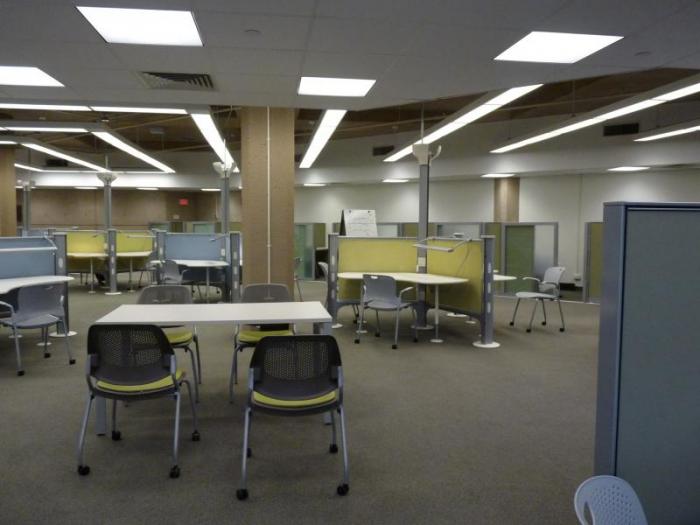
| This space includes: • 11 individual carrels that can seat up to 2 people, with doors for privacy • 2 open carrels • 3 group study rooms (rooms 315, 316, 319) • Mestro Care terminals (room 320) • 10 “Resolve Units” with 3 individual work surfaces • Casual seating |
In addition to Level 3, we have a variety of other study spaces available in the Library. On Level 2R, Conference Room 212C is available when not in use for a class or meeting. Room 212E, located behind the Service Desk, can be used for individual and group study. The schedules for these two rooms are mounted on iPads right outside the doors.
Quiet space is available on Level 1 in the Reading Room (room 102), study rooms (rooms 102A, 102B) and the beautiful old Richmond House Room (102E).
Whether you want a quiet or collaborative space, we have an area to suit your needs!
Your Library Liaisons
What are Library Liaisons?
In order to better serve Duke University and the Health System, librarians at the Medical Center Library & Archives have been assigned to work with specific departments or groups.
What can Library Liaisons do?
• Guest lecture in your class or journal club
• Integrate evidence-based practice and information literacy into your course or curriculum
• Collaborate on systematic reviews of the literature and grant preparation
• Consult on literature search strategies and resource selection
Who is my Library Liaison?

Leila Ledbetter, MLIS
leila.ledbetter@duke.edu
919.660.1128


Megan von Isenburg, MSLS
megan.vonisenburg@duke.edu
919.660.1131

Beverly Murphy, MLS
beverly.murphy@duke.edu
919.660.1127

Brandi Tuttle, MSLIS
brandi.tuttle@duke.edu
919.660.1126



DynaMed Plus Available for Extended Trial
Megan von Isenburg, Associate Director, Research & Education

DynaMed Plus, an evidence-based point-of-care information resource, is now available for a one-year trial through July 2017. It's accessible through the Library's Clinical Tools, Databases page, and via mobile devices.
By offering bulleted topic overviews on diseases, drugs and other therapies, DynaMed Plus seeks to make the best available evidence easier to use at the point of care. These topics are formatted for quick look up and link back to the original studies for a deeper dive.
The DynaMed Plus editorial team monitors hundreds of high quality medical journals for new evidence that could impact existing topics. Relevant and valid articles are appraised using standard criteria and assigned the appropriate level of evidence from 1-3 indicated by: Level 1 (likely reliable) Evidence; Level 2 (mid-level) Evidence; and Level 3 (lacking direct) Evidence. Editors ensure that all evidence is objectively reported and synthesized with existing data.
Want DynaMed on your mobile device?
- Access DynaMed Plus while you're on the Duke network.
- Click on the "Sign Up For Remote Access" link at the top of the page
- Create your own username and password
- Download the DynaMed Plus app from your device's app store
- Sign in with your DynaMed Plus username and password
We will be seeking information about how well DynaMed Plus answers your questions and integrates into your workflow. If you'd like to offer feedback or help us gather data on its usefulness, please email us at medical-librarian@duke.edu.
FAQ: Getting Started at the Medical Center Library
|  |
1. How do I find out information about the Library?
If you want to know about us, check the About section of our site for hours, staff, directions, floor plans, blog, how to contact us, and more.
2. I need an electronic copy an article in the Journal of the National Cancer Institute. Where is that located on the Website?
Our e-journals page contains a searchable list of full-text biomedical electronic journals.
3. How do I get access to PubMed and other databases?
PubMed is accessible from the "Quicklinks" option on the main page. Connect to the Databases page for a full list of databases, descriptions, and any access restrictions. Below are a few examples of databases you have access to.
- MEDLINE (via PubMed or Ovid): references to biomedical and nursing journals
- CINAHL: references to articles in nursing and allied health
- ClinicalKey: medical and surgical resources
- Cochrane Library: evidence-based healthcare databases
- ExitCare: patient education materials
- Lexicomp and Micromedex: drug information
- PsycINFO: references to psychology and psychiatry articles and books
- UpToDate: evidence-based point of care resources
- Web of Science: cited references to journal articles
4. Can I access resources from off-campus?
Yes, most of our resources are accessible through the EZProxy by signing in with your Duke NetID and password. For those which are not, remote access is available to Duke employees through http://portal.duke.edu/, the Duke University Web-based VPN. Visit our Web page for more information.
5. Are staff available for training? Can I request help with my research?
We’re here to help you improve your productivity, partner with you on your research project, guest lecture in your class, or help you online. We teach literature searching and information management to individuals and groups. Training can be requested online. We also provide videos and tipsheets for many of our most frequently used resources.
6. Is there a subject guide or tool set just for clinicians?
Yes, selected tools and various topic guides offer quick access to the Library’s electronic resources for clinicians, nurses, students, and other groups in the Duke community. The Clinical Tools Searcher interface allows you search across several evidence-based resources simultaneously.
7. I'm new to Duke and need to check what I have access to via the Libary.
Check here to find out which services are available to you as a Duke employee, patient, or special group within the Triangle area.
8. How do I contact a Librarian for reference and research assistance?
Get help from a librarian via Instant Messaging, text by cell phone, email, phone, or in person. In-depth consultations and search services available. Use our online request form or contact the Library Service Desk at 919.660.1100 to set up an appointment.
9. Are there computers in the Library that I have access to?
The Library provides computers and other equipment to support your research, educational and Duke-related work activities. Check here for Information about computers, PIN workstations, scanners and photocopiers, ePrint, and large screen monitors.
10. How do I get article that the Library does not own?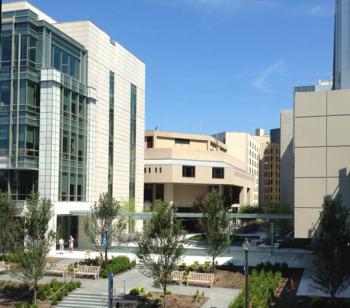 If you need to request articles or books or items not available at Duke, the Document Delivery/Interlibrary Loan service can help you.
If you need to request articles or books or items not available at Duke, the Document Delivery/Interlibrary Loan service can help you.
11. I'm working on a project about the history of Duke Medicine and need some help. Who should I contact?
Medical Center Archives, located at 1408-A Christian Avenue, Durham, NC, has a number of online resources about Duke Health’s history, as well as images, exhibits, and ways to contact the staff for more information.
12. How do I keep up with what's going on in the Library?
Stay current on Library events, classes, new resources, and more, via our blog (RSS feed available).
DUMC Archives Resources Round-up
Lucy Waldrop, Associate University Archivist, Medical Center Archives
Duke University Medical Center (DUMC) Archives has a variety of online resources to help users learn about the collections and the Medical Center’s history.
MEDSpace – If you’re looking for historic images, our digital repository, MEDSpace, is an excellent place to start. MEDSpace contains nearly 700 photographs documenting the history of Duke Medicine. You can also find early publications, medical illustrations and artwork, and medical artifacts.
Digitized Yearbooks – Want to look up a faculty member, an old classmate, or maybe even yourself? Our entire collection of the Aesculapian, the Duke School of Medicine’s yearbook, has been digitized and made available online. Browse or search 34 volumes spanning more than 60 years of Duke history, from 1950 to 2013.
Digitized Intercom – The Intercom, Duke Medicine’s primary news publication from 1953 to 1986, featured information about campus events and construction, faculty and staff news, and articles on medical research and innovations at Duke. The first 25 years of this publication have been digitized, making more than 500 issues available online.
DUMC Archives Guide – Our subject guide provides a brief overview of the Archives, including information about our collections, how to find items, and suggested resources. We recommend it for anyone who is new to Medical Center Archives as an introduction to what we have and how we can help with your research or project.
DUMC Archives African Americans at Duke Medicine Guide – This guide aims to introduce researchers to materials documenting the history of African American faculty, students, and staff at Duke Medicine. Included are recommended oral histories, archival collections, photograph and AV items, publications, selected key dates and key figures, and links to suggested digital resources.
Digital Exhibits – The Archives has several digital exhibits about key figures and events in the history of the Medical Center. Some of the topics include the Duke Poison Control Center, Dr. Wilburt C. Davison’s correspondence with Sir William Osler, and women in medicine at Duke.
DUMC Archives Blog – Updated regularly, our blog is the place to go for Archives news, to see materials from our collections, and discover stories about the Medical Center’s history.
Come Visit Our Medical Garden!

It's spring and the Medical Garden is in bloom! If you are not familiar with our garden, come visit our table at the Farmer's Market on September 9 from 11a-2p. You will have a chance to get some information, explore some common medicinal herbs and plants, and pick up a few samples. We hope to see you there!
Easy Access from Off Campus
Need to get to journal content or other library resources from off campus? Simply start at our Website! You will be prompted to sign in with your Duke NetID and password once you get to a resource that requires authentication. No VPN or Virtual PIN is needed!
There are only a few resources that require the VPN – Micromedex, PIVOT, FormWeb, and ExitCare Patient Education. If you need drug information from off campus, Lexicomp only requires your NetID and password. The Duke Medicine network and clinical systems, including the Duke Medicine VPN, use Multi-factor authentication (MFA). You will be asked to type a second password to access our resources. For more information, see the VPN and Multi-factor Authentication Video.
Be sure to use the Duke version of PubMed if you're off campus and need to get to full text. When you find an article you want to read, click on the Get it@Duke button, which will prompt you to sign in with your Duke NetID and password. Remember that Get it@Duke will only take you to the full text of what we subscribe to. If we do not subscribe to the content you are looking for, you will be able to use Get it@Duke to look for the journal in the catalog or to request the article through Document Delivery/Interlibrary Loan Services. The DUMCL Online button only works on campus or on the VPN.
When accessing UpToDate, start at our Website and click on UpToDate under the Quicklinks. You’ll be prompted to sign in with your Duke NetID and password.
If you have any trouble accessing our resources from off campus, please contact the Library at 919.660.1100, email medical-librarian@duke.edu, or use our chat box.
Streamline Searches with SmartSearch!
Jamie Conklin, Research and Education
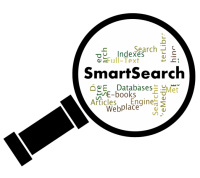
SmartSearch, our "discovery" tool, allows you to search across multiple databases at the same time and quickly find full text, providing a fast, streamlined search through a single search box.
Simply enter your search terms to find results from PubMed and other databases, as well as from full-text journals available through the Duke Medical Center Library & Archives. You'll be reading articles in no time!
In addition, SmartSearch's ability to utilize specialized subject indexes and search multiple sources at once can help you broaden your research to areas possibly not previously considered. You'll find results from CINAHL, PsycINFO, and other subject-specific databases and journals.
Need e-books instead of journals? A separate tool searches across all full-text e-books available through the Duke Medical Center Library & Archives.
To keep search results focused on biomedicine and not too overwhelming, we have not included all the databases or journals available at Duke. SmartSearch also does not search the online catalog. Please be sure to keep this in mind and use other databases and resources for broader topics outside biomedicine.
You can access SmartSearch from the "Quicklinks" section of our Website or from the Databases page. If you have questions about SmartSearch, please read more about it or Ask a Librarian.
Featured New E-Books
Barbara Dietsch, Acquisitions & Cataloging Manager, Collection Services
Here are a few of our newly-acquired e-books. Reviews are excerpted from Amazon.com.
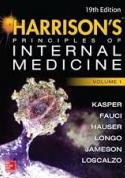 Harrison's Principles of Internal Medicine
Harrison's Principles of Internal Medicine
Dennis Kasper and Anthony Fauci
Through six decades, no resource has matched the authority, esteemed scholarship, and scientific rigor of Harrison’s Principles of Internal Medicine. Capturing the countless advances and developments across the full span of medicine, the new 19th edition provides a complete update of essential content related to disease pathogenesis, clinical trials, current diagnostic methods and imaging approaches, evidence-based practice guidelines, and established and newly approved treatment methods.
Statistics for Health Care Management and Administration: Working with Excel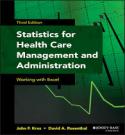
John F. Kros and David A. Rosenthal
Statistics for Health Care Management and Administration is a unique and invaluable resource for students of health care administration and public health. The book introduces students to statistics within the context of health care, focusing on the major data and analysis techniques used in the field.
 Foundations of Clinical Research: Applications to Practice
Foundations of Clinical Research: Applications to Practice
Leslie G. Portney and Mary P. Watkins
This book provides the foundations necessary for finding and interpreting research evidence across all healthcare professions. It has been revised to reflect the most current changes in the field of clinical research in rehabilitation and medicine, including the growing emphasis on evidence-based practice (EBP) and the new vocabulary being integrated into research and practice across disciplines.
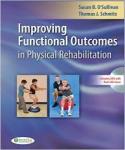 Improving Functional Outcomes in Physical Rehabilitation
Improving Functional Outcomes in Physical Rehabilitation
Susan B. O'Sullivan and Thomas J. Schmitz
This is a practical, step-by-step guide to understanding the treatment process and selecting the most appropriate intervention for your patient. Superbly illustrated, in-depth coverage shows you how to identify functional deficits, determine what treatments are appropriate, and implement them to achieve the best functional outcome for your patients.
Translation of Evidence Into Nursing and Health Caretra 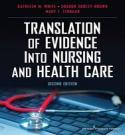
Kathleen M. White, Sharon Dudley-Brown, and Mary F. Terhaar
This resource is designed as a textbook for the DNP curriculum and as a practical resource for more seasoned health professionals. The acclaimed text encompasses an interprofessional approach to translating evidence into nursing and health care practice that is useful for both clinical and nonclinical environments.
Suggestions for purchases? Complete our online Recommend a Purchase form or contact Emma Cryer Heet. For a complete list of titles added to our print book collections within the last 3 months, check out the Library's newest print book additions or subscribe to our "New Books" feed.
Who is Responsible for Compliance with the Public Access Policy?
Pat Thibodeau, Associate Dean for Library Services & Archives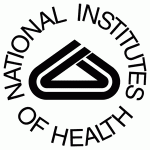
The bottom line is that the PI is responsible even if not an author on the article. Any author or PI can submit the manuscript file(s) and approve the submission, but unless the submission and final version are approved, the publication becomes non-compliant within 30 days of publication. That can be a problem when renewing or seeking funding.
AUTHORS! You can help the PIs by letting them know when a manuscript attributed to their grant has been submitted for publication.
How do I track publications?
- Set up a saved search in PubMed using your grant number(s) or the names of other investigators or trainees on the grant.
- Get a weekly or monthly alert.
- Contact our Librarians (919.660.1100) to get help with setting up a saved search.
What if the authors do not comply or approve the submissions?
- PIs can take over the approval process of a manuscript submission, even if someone else started it.
- While there are claiming instructions on our Compliance Guide, our Librarians can help walk you through this process.
Best Practice...
- Submit your version of the manuscript (usually the final galley proof or the version with scientific and technical edits) as soon as the article has been fully accepted and edited for publication.
- Submit the manuscript through your "My NCBI / My Bibliography" account or directly to the NIH Manuscript Submission (NIHMS) System.
- WATCH for approval reminders from NIHMS and from our Librarians!
Need Help?
- Our Librarians make house calls! We can come to your office and work with PIs, authors and other staff on becoming compliant.
- We can also provide on-site training for staff who normally manage manuscripts and compliance issues.
Exhibit on Display Features Duke Health’s Founders
Jolie Braun, Assistant Director, Medical Center Archives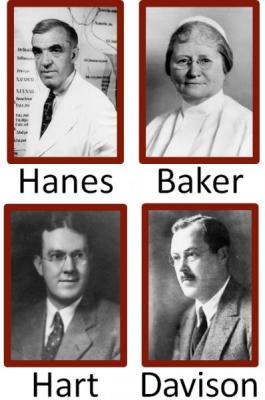
Currently on Display
Early Duke Notables
Medical Center Library & Archives - Levels 1 and 2R
June - September, 2016
We are happy to announce that our new exhibit, Early Duke Notables, is now on display. Featuring artifacts, photographs, and documents from the Medical Center Archives collections, the exhibit highlights some of the key individuals who helped found Duke Health and their contributions.
Items on display include original hospital floorplans with Dr. Wilburt C. Davison’s notes, a 1930’s nursing cap from the first School of Nursing Dean Bessie Baker, a patent for one of Dr. J. Deryl Hart’s inventions, and a letter from Dr. Frederic M. Hanes about establishing the Duke Gardens.
To learn more about Duke Health history, visit the Medical Center Archives Website.
Staff News
Congratulations to the following staff members who received Duke University Career Service Awards for 2016.
 |
| (l. to r. front) Vanessa Sellars - 30 years; Eugene Lofton - 15 years; Ashley Brown - 10 years (l. to r. back) Brandi Tuttle - 10 years; Virginia Carden - 30 years; Elizabeth Berney - 10 years |
Farewell to Derrick and Jolie
Barbara Dietsch, Acquisitions Manager, Collection Services
 Derrick Vines
Derrick Vines
After 24 years at the Medical Center Library & Archives, Derrick began a new endeavor in April with the Duke Office of Clinical Research as Coordinator of the Training and Communications Team. Part of his responsibilities include training new clinical research coordinators on Maestro Care for Clinical Researchers. We still see him quite frequently in the Library as he teaches in the Library’s Computer Classroom. He is also responsible for maintaining the DOCR Website and introducing new technologies for the Training and Communications Team. Some of those technologies will include innovative ways to offer training to the clinical research community at Duke.
Derrick graduated from Morehouse College in 1992 with an undergraduate degree in Marketing. He began working in the Medical Center Library & Archives as a temporary employee in 1992 and became full-time in 1993. Before joining the Systems/Information Technology Services Department as Desktop Support Manager, he worked in the Library's Circulation Department and the Learning Resources Department.
 Jolie Braun
Jolie Braun
Jolie left her position as Archives Assistant Director and Archives Librarian for Research, Outreach, and Education in June to begin employment at Ohio State University. Her new position is Curator of American Literature, which is part of the Rare Books and Manuscripts Library at Ohio State University. In this position, she will provide instruction, teaching and research support, and build and manage the collections associated with the William Charvat Collection of American Literature.
Jolie came to us in 2012 from Washington University in St. Louis where she worked in the Modern Graphic History Library performing reference and outreach activities. Prior to that, she worked in the Becker Medical Library at Washington University and has additional experience as a grants coordinator, an English instructor, and a journals production editor.
Jolie received her MLIS, with an archival concentration, from San Jose State University. She also has an MA in English from the University of California-Davis. She completed her undergraduate degree at the University of Massachusetts-Amherst with a double major in English and Women's Studies.
Improve Your Library Research Skills!
The Medical Center Library offers training on a variety of topics. Request a session for yourself or a group, or schedule an appointment for a research consultation.
Publication Schedule & Staff
Duke University Medical Center Library & Archives News is published bimonthly.
| Pat Thibodeau, Associate Dean | Beverly Murphy, Editor |
| Editorial Board: | |
| Jamie Conklin | Barbara Dietsch |
| Megan von Isenburg | Lucy Waldrop |
Subscribe to our newsletter and be notified when a new issue is published!

